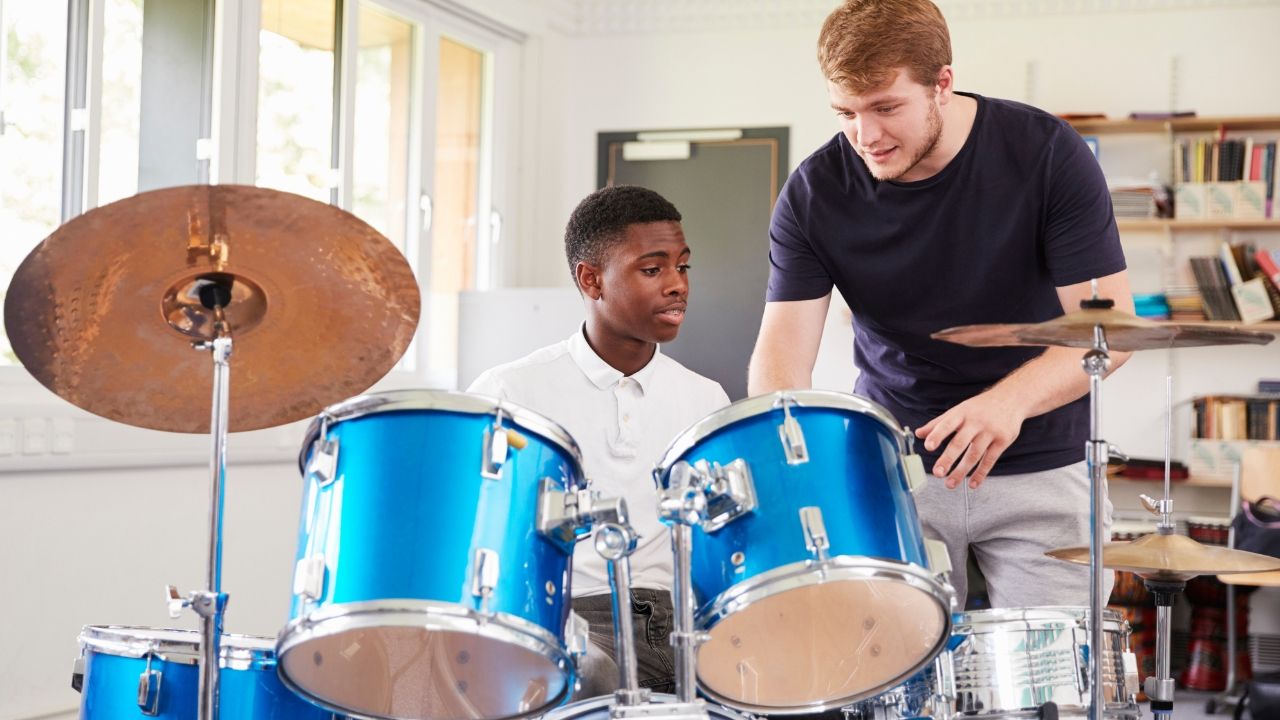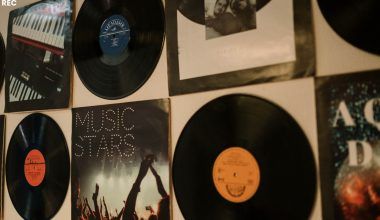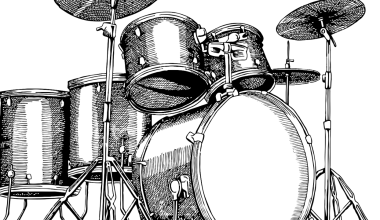Balancing academics and music creation can be challenging when you’re in college. Many students feel torn between their academic responsibilities and their passion for music. But the truth is, college can be one of the best times to start making music. You have access to resources, a community, and the time to experiment with your sound. This guide will help you understand how to make music when in college and manage your time effectively so that you can pursue your passion without compromising your education.
Set Clear Goals for Your Music
The first step in learning how to make music when in college is to set clear goals. Ask yourself what you want to achieve with your music. Do you want to create an album, start a band, or just experiment with sounds? Setting goals will help you stay focused and motivated. Break down your goals into smaller, manageable tasks that you can work on alongside your studies.
Pro Tip: Write down your goals and place them where you can see them daily. This constant reminder will keep you motivated even when college life gets busy.
Time Management is Key
Balancing college work and music creation requires excellent time management. Use tools like calendars or time management apps to schedule your study sessions, classes, and music practice. Block out specific times during the week dedicated solely to music. This way, you won’t feel guilty about spending time on music instead of studying.
To learn how to make music when in college effectively, treat your music time as seriously as your study time. This will help you stay committed to both your academic and musical goals.
Use College Resources
Colleges often have excellent resources for students interested in music. From recording studios to practice rooms, these facilities can be a huge advantage. If your college has a music department, get to know the professors and other students who might be willing to collaborate or offer guidance.
Leveraging these resources is a smart way to enhance your learning experience and is a crucial part of mastering how to make music when in college.
Pro Tip: Join the college music club or any relevant societies. This is a great way to meet like-minded people and gain access to exclusive resources.
Collaborate with Fellow Students
One of the best ways to learn how to make music when in college is through collaboration. Working with others can lead to new ideas and help you learn faster. Collaborate with students who play different instruments, have different tastes in music, or possess different skills, like production or mixing.
By collaborating, you not only improve your own skills but also expand your network, which can be invaluable in the future.
Pro Tip: Don’t limit yourself to musicians only. Work with video producers, visual artists, and writers to create multi-dimensional projects.
Take Advantage of Technology
In today’s digital age, making music has never been easier. There are countless apps and software available that allow you to create professional-sounding music right from your dorm room. Learn to use Digital Audio Workstations (DAWs) like Ableton Live, Logic Pro, or FL Studio. These tools are essential for anyone wanting to know how to make music when in college.
Pro Tip: Many software companies offer student discounts. Take advantage of these offers to get the tools you need at a lower cost.
Find Your Unique Sound
College is a time for exploration, and this applies to your music as well. Experiment with different genres and sounds to find what resonates with you. Don’t be afraid to step out of your comfort zone. The more you experiment, the better you’ll understand your musical preferences and strengths.
Finding your unique sound is an important step in mastering how to make music when in college. It will set you apart from others and help you build your identity as an artist.
Pro Tip: Keep a music journal. Document your experiments, inspirations, and any breakthroughs. This will help you track your progress and refine your sound.
Perform Whenever Possible
Performing live is one of the best ways to gain confidence and improve your music skills. Look for open mic nights, college events, or even local cafes that allow live performances. The more you perform, the better you’ll become at handling stage fright and engaging with an audience.
Pro Tip: Record your performances and watch them later. This will help you identify areas for improvement. Also, share these recordings on social media to build your online presence.
Network with Industry Professionals
Learning how to make music when in college also involves networking with industry professionals. Attend music workshops, seminars, and conferences whenever possible. These events are a great way to learn from experienced professionals and can open up opportunities for internships or collaborations.
Pro Tip: After attending events, follow up with the contacts you’ve made. A simple thank-you email can go a long way in building professional relationships.
Social media is a powerful tool for musicians. Start building your online presence by sharing your music on platforms like Instagram, YouTube, and SoundCloud. Engage with your audience by sharing behind-the-scenes content, live sessions, or even your creative process.
Understanding how to make music when in college isn’t just about creating music; it’s also about sharing it with the world. Social media can help you reach a wider audience and build a fan base while still in college.
Pro Tip: Consistency is key. Post regularly and interact with your followers to keep them engaged.
Take Care of Your Mental Health
College life can be stressful, and adding music creation into the mix can sometimes feel overwhelming. It’s important to take care of your mental health. Ensure you’re getting enough sleep, eating well, and taking breaks when needed.
If you ever feel too stressed, don’t hesitate to reach out to a counselor or a trusted friend. Maintaining good mental health is key to successfully learning how to make music when in college.
Pro Tip: Practice mindfulness or meditation. These practices can help you manage stress and keep a clear head, which is essential for creativity.
Balance Your Academic and Musical Life
It’s important to find a balance between your academic responsibilities and your music. Prioritize your tasks and know when to focus on your studies and when to indulge in your musical pursuits. Remember, it’s okay to take a break from music if you need to focus on exams or major assignments.
The key to knowing how to make music when in college without compromising your education is balance. Strive to maintain that balance to ensure success in both areas.
Pro Tip: Use a planner to organize your tasks. Visualizing your schedule can help you allocate time for both studies and music efficiently.
Learn from Feedback
Whether it’s from peers, professors, or online listeners, feedback is invaluable. Don’t take criticism personally. Instead, use it to improve your music. Learning how to make music when in college also involves learning how to accept and grow from feedback.
Pro Tip: Keep an open mind. Sometimes, constructive criticism can lead to breakthroughs in your music. Try to view feedback as a tool for growth rather than as a personal attack.
Keep an Open Mind and Stay Adaptable
College is a time of learning and growth. You may find that your music evolves as you gain more experiences. Stay open to change and be willing to adapt. Whether it’s trying a new genre or collaborating with someone new, staying flexible will enhance your music journey.
Adaptability is a crucial skill when learning how to make music when in college. It allows you to grow as an artist and take advantage of new opportunities.
Pro Tip: Experiment with different instruments or music production techniques. This will keep your creative process fresh and exciting.
Monetize Your Music
If you’re serious about pursuing a career in music, college is a great time to start monetizing your work. Platforms like Bandcamp, Spotify, and Apple Music allow you to sell your music or earn royalties from streams. Additionally, you can perform at paid gigs or offer music lessons to earn some extra cash.
Understanding how to make music when in college also involves knowing how to monetize your passion. Start small and grow as your skills and audience expand.
Pro Tip: Look into creating merchandise. Selling T-shirts, posters, or other items can be a fun way to earn money and promote your music.
Don’t Be Afraid to Fail
Failure is a part of the learning process. Not every song will be a hit, and not every performance will go as planned. What’s important is that you learn from these experiences and keep moving forward. The path to mastering how to make music when in college is filled with ups and downs, but each experience will make you stronger and more resilient.
Pro Tip: Keep a failure journal. Documenting what didn’t work and what you learned from it can be a powerful tool for personal and artistic growth.
Build a Support System
Having a support system is crucial when juggling music and college. Surround yourself with people who understand your goals and can offer encouragement. Whether it’s friends, family, or fellow musicians, having a network to rely on can make all the difference.
A strong support system will help you stay motivated and focused on your journey to mastering how to make music when in college.
Pro Tip: Join online communities or forums where you can share your experiences and get advice from others in similar situations. These communities can provide valuable support and insights, especially when you face challenges in balancing your music with your academic responsibilities.
Pro Tip: Engage actively in these communities by offering help and sharing your progress. The connections you make can lead to future collaborations and opportunities.
Explore Different Music Styles and Genres
College is a perfect time to explore various music styles and genres. Don’t limit yourself to what you already know. Dive into classical, jazz, electronic, hip-hop, or any other genre that piques your interest. This exploration can enrich your musical vocabulary and influence your original compositions.
Exploring different styles is a key part of learning how to make music when in college. It allows you to draw from a wide range of influences, making your music more unique and versatile.
Pro Tip: Attend live performances and concerts of different genres. Experiencing music live can provide new perspectives and inspire your creative process.
Develop Your Music Theory Knowledge
While it’s essential to feel your music, having a solid understanding of music theory can greatly enhance your creative process. College often offers courses in music theory, which can help you understand the structures behind the sounds you love. This knowledge can empower you to create more complex and polished compositions.
Understanding music theory is an integral part of mastering how to make music when in college. It provides you with the tools to express your ideas more effectively and explore new creative possibilities.
Pro Tip: If your college doesn’t offer music theory courses, consider online courses or tutorials. There are many free and paid resources available to help you deepen your understanding of music theory.
Utilize College Radio and Media Outlets
Most colleges have their own radio stations or media outlets. These platforms can be a fantastic way to get your music heard by a broader audience. Reach out to the college radio station to play your tracks or even consider hosting your own music show. This exposure can build your campus presence and help you gain valuable feedback from listeners.
Getting your music featured on college radio is another effective strategy for mastering how to make music when in college. It provides a platform to share your work and connect with the college community.
Pro Tip: Offer to perform live on air or participate in interviews. This can give you more visibility and help you build a following within your college.
Learn About the Music Business
Creating music is only one part of becoming a successful musician. Understanding the music business is equally important. Take time to learn about royalties, distribution, marketing, and contracts. Many colleges offer business or music business courses that can equip you with the knowledge you need to navigate the industry.
Learning the business side of music is crucial for anyone serious about understanding how to make music when in college. It prepares you for the realities of the music industry and helps you make informed decisions about your career.
Pro Tip: Consider internships or part-time jobs in the music industry. Working with a record label, music venue, or production company can provide hands-on experience and valuable industry insights.
Conclusion
Making music while in college is not only possible but can also be incredibly fulfilling. By setting clear goals, managing your time effectively, and utilizing the resources around you, you can successfully balance your academic life with your passion for music. Remember to stay adaptable, take care of your mental health, and never stop learning. With dedication and the right strategies, you’ll not only master how to make music when in college but also lay a strong foundation for your future music career.
By following these tips, you’ll not only learn how to make music when in college but also how to thrive as a student-musician. Keep creating, stay motivated, and most importantly, enjoy the journey.
For further reading, explore these related articles:
- How to Use Your Time to Create Music
- The Transformative Role of Data and Analytics in Music Distribution
- Evolution of Music Listening Devices: From Vinyl to Streaming in 2024
For additional resources on music marketing and distribution, visit Deliver My Tune.






